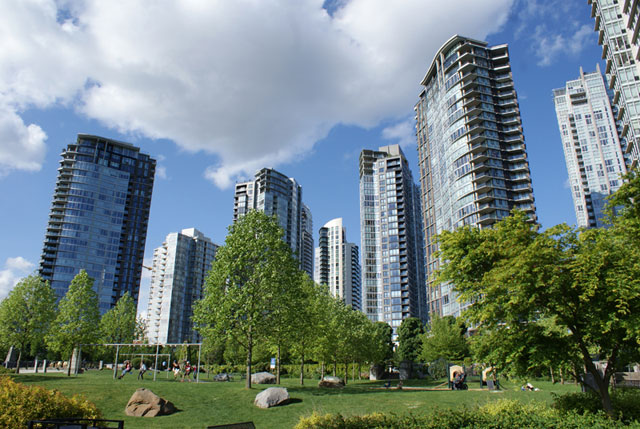How to sell a fourplex — the lessons learned
 Welcome to Part II of my saga on how to sell a fourplex.
Welcome to Part II of my saga on how to sell a fourplex.
In the last episode we learned how I went from mid-level, average pay employee to suddenly relatively wealthy in a very short time period. Having grown up as a dirt-poor farm boy, I was desperate to not blow my opportunity. I put some of my windfall into two fourplexes, one of which I sold some time ago. When we last left our story, it was spring and I had just received an offer on my fourplex.
After years of trying, I couldn’t believe what I was seeing: A legitimate offer from a well-funded buyer who was already pre-approved and ready to go. The offer wasn’t for full price, reflecting the current buyers’ market. But I’d raised my price by $20,000 over the previous year’s selling price so I was still in great shape. I assumed there would be some requested repairs but my starting place was so much better than the prior year.
I was also much smarter about the preparation on the front-end this time. My realtor and I met my property manager at the building and did a walk-through to try and catch any obvious surprises that might scare away a potential buyer. I hadn’t actually been to the site in years and was hoping to never see it in-person again, but there I was, once again smelling that distinct aroma that for some reason only rentals give off.
Why would I sell?
My reason for selling was half emotional and half practical. I could make a convincing argument for holding it or for selling it just depending on how I looked at things.
The practical side:
- I had been theoretically living off this income since I left my last corporate hellscape. Unfortunately the maintenance costs had been running very high (mostly due to various improvements aimed at selling it).
- I was at the point where the kitchens and bathrooms needed a major overhaul if I was going to keep it. At at least $5,000 for each, that’s $40,000 more I’d need to invest in the building. And that’s if I did the work. And I couldn’t really even do that myself right now while I take care of Pretired Baby so I’d really need to pay someone to do it for me, dragging the price even higher. It’d take awhile to make that back. If I was honest, it really should be completely replumbed and rewired as well. Essentially the building was reaching the end of its useful life. Nothing really “wrong,” just basically wearing out.
- Now that I was in a place where it was becoming possible to sell it, I began looking around at other investment opportunities. When I did the math on what I could earn by reinvesting my money elsewhere, I could clearly do better or at least as well in another avenue. Additionally I was watching some great single family homes go for dirt cheap. (I missed out on the best deals already because I couldn’t get my funds out of this property.) I did my best to look at the situation dispassionately: If I were a ruthless corporate holding company, would I continue to invest in and hold an under-performing business unit? Or would I eventually cut my losses and reallocate the funds in a better performing place?
- The clincher: aluminum wiring. The building was built in the 1970s, which was the source of nearly all its headaches. Now I advise people to avoid buying anything built in the ’70s, but before I was such a brilliant person I blundered into buying something built during this cursed decade. There are many problems directly related to the cheap construction of this era, but the worst one was the aluminum wiring. Now electricians will tell you that aluminum wiring isn’t necessarily “unsafe”, especially if it’s maintained correctly. Its two main problems are that aluminum expands and contracts at a higher rate than copper, causing connections to loosen over the years, and, more importantly, it doesn’t mix well with copper, which is what you’ll find in every electrical device you can buy. The mixed connections will heat up and can even cause a fire. So while it wasn’t an imminent danger and I always took very good care of the electrical system, it was always a worry.
The emotional side:
- Like I said the building needed significant modernization if it was to remain a viable rental. They were pretty nice units as rentals in this sector of the market go, but beyond just being a little rough around the edges, they really needed to be brought up to modern standards. And I was just sick of dealing with them.
- Tenant hassles. Although I fortunately didn’t have to deal with tenants directly, I was still dealing indirectly with all the stupid nonsense that takes place. And even when it wasn’t extra costs due to a renter throwing their trash outside instead of actually putting it into a garbage can, it was someone not paying their rent or bringing in a prohibited pet cat and stinking up the place.
- Even beyond the aforementioned aluminum wiring, every year (especially around christmas) there were occasional news reports of a tenant burning down an apartment building. The most common cause seemed to be overloaded electrical outlets (multiple extension cords and plug expanders on one outlet) followed by smoking or candles. I never had any problems, but I was always worried about a tenant doing something stupid.
- Although the cashflow was normally good, it never failed that a big repair would coincide with a vacancy. So while the building did OK on a yearly basis, it wasn’t exactly a reliable stream of income.
- Feeling trapped. While I’m still a big believer in real estate investing and find it actually pretty hard to lose money with real estate, it’s obviously not very liquid. When the market took a big downturn, I was salivating at the cheap stocks and houses for sale but I didn’t have the free cash to pounce. Frustrating!
So after putting my doubts to rest, I decided at minimum I was in the win-win situation. Either I’d sell and reallocate my money to some place more lucrative, or I’d hold it and pocket another year’s rent. Which is why I now found myself walking through my units after all these years, trying to see them through the eyes of a potential buyer.
Actually, the place was in great shape. The best shape it’d been in since it was built, probably. There wasn’t much to request. I asked for some dirt to be evened out in the backyard, a new light fixture cover, a few other minor repairs, but generally there wasn’t much to complain about. The roof was brand new, fixed the prior year after some potential buyers complained it was feeling soft (it was due anyway). I replaced the gutters and brought in fresh bark to spiff up the street view. There were still some signs that birds had been accessing some areas in the attic space and I asked the property manager to have someone come out and seal that up a little better.
After my walk-through, I had to think about it a bit. Did I really want to sell? After all, it looked like something I’d consider buying today, even knowing what I know. Maybe I should hold another year and pocket a little more rent? After all the market could run up another year or even have a nice jump. But in the end, I knew my reasoning was sound and even if I could squeeze a little more money out of it by waiting another year, I knew I was done.
An offer — immediately
We polished up the listing paperwork, threw it out on the internet. My realtor was very nervous about my strategy of raising the price so substantially (we’d be the highest-priced fourplex in the area and hardly anything had been selling). But I wanted to present a show of strength — I wasn’t a short-sale. I didn’t need to sell at all. Buy a great building at a fair price, people!
Well, imagine our surprise when an offer came through right away. A little below my asking price, but still higher than I’d tried to sell it for the year before. And it was clean. The buyer’s realtor boasted of his clients “business sophistication” and how well-funded he was. We accepted the offer and braced ourselves for the inspection phase.
It was some time around this point when I was informed that one of the tenants wasn’t paying and couldn’t be reached. So it was time to launch an eviction process on top of everything else.
Anything that involves gaining access to the interior of a rented unit takes a lot longer than you think it would. You either have to work around tenant schedules or you have to post legal notice and wait a couple days to get access. Plus I now had a wildcard. Would the tenant simply be gone or would there be a stubborn refusal to cooperate? Would the unit be destroyed in the middle of this transaction? Would the buyer walk away?
So it was nearly a week later that we got the inspection response back from the buyer. And the response was they wanted further inspection. The roof apparently still seemed soft in a few places (even though it was brand-new). They wanted to cut holes in the upper units to gain access to the attic space — WTF?
Would I ever close?
There were no attic access panels in my building at all — something I’d never noticed or thought about before. In retrospect, it was a little surprising that the inspector didn’t notice that when I bought it. I greatly dreaded letting someone cut into my ceiling. For one, who knows what they’d find? Did a $50,000 problem lurk up there unbeknownst to me? The unit where the cutting-in would need to be done would be in a unit where a new tenant had just moved in. How annoyed would this tenant be with the noise and drywall dust? Plus, I felt terrible that I’d have to disrupt this poor person’s life again.
In the end, however, I decided it was reasonable that a buyer want to look up there. After all, if I said no, they’d assume I was hiding something, so I acquiesced.
Now in the 1970s, developers here in the Seattle area tried to replicate a lucrative strategy from California. It was pretty simple: Build a lot of cheap housing and flip the buildings off to hungry investors. Unfortunately they also tried replicating the construction techniques, the silliest of which was a flat roof design. One thing you might have heard about the Seattle area is that we have this thing called “rain” here. Sometimes a lot of it. In the area where my property was located you get a ton of it.
Once the inspector peeked up into my attic, we learned that my building had once been a flat-roof construction and the sloped part was added later as sort of a superstructure sitting on the top. Worse, the inspector felt it was flimsy and had even been built with scrap materials. Naturally the buyers acted as if this was an extreme hazard (even though the building had already lived through 40 years of rain, snow and wind without any problems). They demanded it be rebuilt to modern code. This was a big problem because not only would it cause big delays and be expensive, but the tenant impacts could be significant.
Additionally they reported there were STILL BIRDS living in the attic.
So we managed to talk them into a credit for the roof so that we could close sooner (ouch!). We sent the contractor back out AGAIN to deal with the birds. He did some additional sealing and assured us that this time it was definitely all sealed up.
Feeling like we were finally in good shape, the buyers did another reinspection and quite indignantly told us several items hadn’t been completed. Aaaarggh! Worse, they said the building still had birds penetrating the structure and what were we trying to pull?
Our contractor went back out once again and did find one spot where there still some birds. They were babies and in a corner where he couldn’t reach. He could seal them up inside, but we none of us wanted to do that. He agreed to leave a gap so the cheeping babies could escape when they were old enough and told the buyers we weren’t baby bird killers so that would have to be good enough.
A wackjob realtor
Early on in the process I began to get the sense that buyer’s agent wasn’t playing with a full deck. The tone of his emails were disproportionately indignant and there was always a lot of complaining that his buyer was “taking all the risk”. Worse, he became increasingly dishonest, abusive and rude. On top of that we experienced occasional passive-aggressive behavior where he wouldn’t respond to emails and calls from my agent and wouldn’t rationally discuss how to work through the various issues to reach a closing. Somehow we had blundered into a deal with a nightmare opposing realtor.
As the months rolled by, I began to regret not listening to my instincts. I should have canceled out of this deal as soon as I realized I was dealing with an unprofessional nutjob.
I am a very good negotiating partner. Having taken negotiation training, I go into all my deals knowing my walk-away point and work cooperatively with my opposing partner to reach agreement. If we can’t reach agreement, it’s based on our interests not being aligned and both sides typically walk away feeling OK about the interaction. So I was willing to accept nearly any reasonable request. After months of dealing with this psycho, however, I told my realtor I was done. If they asked for even $100 more the answer was no and I would flush the deal. I had completely had it.
Fortunately(?) my realtor was able to talk me down and held things together and we finally reached the point where all sides were satisfied and we were on to the closing.
Just one hurdle left: the birds. Would they be satisfied with our plan? To make everything extra legit, I had a pest control company go out and tell us what should be done. They suggested some additional screening be added on top of what the contractor had done. So once again, we had him go out and seal up the building, leaving a gap so the baby birds could escape when they were old enough. Everyone finally seemed satisfied.
I’m brushing over a lot of detail and back-and-forth that took place. It was endless. I lost track of how many close-date extensions I signed, but it was several. But finally, we just had to wait for the closing paperwork from the lender to come through and we’d be there. Just a few more days.
I got the invite to sign papers. My wife and I went out to an expensive dinner to celebrate and I started to relax.
D’oh!
As you might expect, the dinner was premature. The next day, I got a call from my realtor. “I hope you didn’t crack open that bottle of wine yet,” he said. There was a hold-up on the lender side. Turns out my brilliant, well-qualified, “business-savvy” buyer thought it’d be a really good idea to buy another house right in the middle of our close. Um, what?
The lenders had to re-analyze the situation. We signed another extension. And waited. I started thinking about next steps in the event we didn’t close. I’d need to fill the vacant unit asap. Since summer was now nearly over, I could keep it listed, but it’d be unlikely to get another offer before winter kicked in so I began thinking about rehabbing the units.
Finally the call came in: the lender was still going to make the loan, but they would have to redraw the paperwork. Because it would put us past the 15th of the month, I’d need to make another mortgage payment (which should be refunded back to me later). Annoying!
In the meantime, the contractor swung by, noticed the baby birds had flown away, and sealed up the final gap in the building.
Finally the day came. It sounded like the paperwork would be processed by noon and we should be closed by 3 p.m. Amazing! I kept my phone handy all day, frequently checking my phone to make sure I was still signed in to Google Voice (see my lower cell phone bill project for background!) Then the call: No, I wasn’t closing. The lending paperwork wasn’t in yet and could be another week. At this point, I pretty much gave up. If it closes, fine, if it doesn’t, whatever. I. Was. So. Done.
But the next week, the call I was waiting for came in from escrow: the deal was closed. The paperwork arrived via email later that day.
That night I slept the long, deep sleep of the relieved and awoke to a shiny summer morning. A cool breeze was blowing in the window and everything felt clean and carefree.
The next day I called my property manager to let him know we no longer owned the building. He sounded relieved after months of hassle. “That’s good timing,” he said. “I just got off the phone with a tenant. Her shower isn’t working. I’ll let the new owner know.”
Postscript: lessons learned
Looking back, I can now see I made many errors throughout the ordeal, many of which were caused by my emotional desire to move on with my life. Fortunately I was in the win-win position where I was OK if we sold and OK if we didn’t sell. Here are a few of the lessons I learned, just in case it helps anyone else down the road:
- Don’t be bullied. I’ve always found the best way to deal with bullies is to stand up to them (they’re nearly always so stunned someone is saying no that they collapse immediately). But in this case my posture was too accommodating. I wanted to be helpful, transparent and honest. They took advantage of my attitude and I should have put a stop to their craziness long before I finally did.
- Say no to stupid requests. One of my dumber blunders was agreeing to do the sewer inspection for them. I just agreed to it without thinking, since it seemed like a small thing. Later I was like, “Why the hell am I doing their inspections for them?” I knew better and fumbled right into that one. I’m sure the buyer got a good laugh out of that one. Fortunately for me, my realtor agreed it was a blunder and he picked up the tab for that.
- Make sure tenants are stable before you list. We were very close to having an empty unit filled when we decided to list. The vacant unit made for a nice convenience since the prospective buyer could view the empty unit and make sure they were fine with the basic set-up before making an offer and requesting access to the other units. However in the midst of the sale process, another tenant stopped paying, triggering an eviction. That meant the buyer would be buying a half-empty unit, sending up all kinds of red flags. In my case they buyer wasn’t sophisticated enough to understand the potential impacts, but it could have been a major problem. Most worrying for me, was that the lender could actually hold up the deal until all units were full. In the end, it was just an additional stress point, but it didn’t have any real impact. The buyer asked us to fill the unit where the eviction had taken place and we in turn asked if they had a lease they wanted us to use or if they wanted to review the potential renters first. They never responded to our questions on that so the building actually closed with just three units full.
- Place time limits. Earlier on I should have realized they were just toying with me, signed a final two-week extension and let them suck it. But I kept playing along until the very end.
- Refuse additional inspection. Now for something reasonable, I think it’s only fair to allow further inspection. But my building had been operating just fine for 40 years without issue. To allow someone to cut into a tenant’s unit to look for trouble was a bad idea. I should have refused. They may have backed out of the deal, but I would have been left then with a sane buyer or another year of rent.
- Pre-inspect your own building. It wouldn’t have saved me from a ton of hassle in my case, but I could have avoided a few glitches by hiring my own inspector first. I think it’s definitely a good idea.
- Hire a local realtor who knows the area and who knows multifamily. I love my realtor and I especially like that he knows how to hold deals together, but his distance from the property did create some hassle and if he’d been local he would have known the buyer’s agent was a loon and we could have avoided a mess early-on. He also didn’t have a ton of multifamily experience. That was OK but it could have been helpful if he had a little more savvy in that area.
- Don’t deal with crazy. In the latter years of my working career, I pretty much just stopped dealing with crazy people (which is harder than it sounds given that at least 30% of the workforce is basically nuts). I should have backed away once I saw I was dealing with a crazy person. Instead I tried to fight through it, causing myself all kinds of stress.
Maybe one of these days I’ll write up some advice on owning rentals in general. But hopefully if anyone out there is looking to sell a fourplex, some of this advice will be helpful.
Let me know what you think! How badly did I botch this deal? What else could I have done differently?





